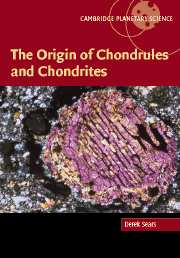Book contents
- Frontmatter
- Contents
- List of figures
- List of tables
- Preface
- 1 Historical introduction
- 2 Potential meteorite parent bodies
- 3 Chondrites and their main properties
- 4 Chondrules and their main properties
- 5 Theories for the origin of chondrules
- 6 Discussion of theories for the origin of chondrules
- 7 Discussion of theories for metal–silicate fractionation
- 8 So how far have we come and where do we go next?
- References
- Index
6 - Discussion of theories for the origin of chondrules
Published online by Cambridge University Press: 12 August 2009
- Frontmatter
- Contents
- List of figures
- List of tables
- Preface
- 1 Historical introduction
- 2 Potential meteorite parent bodies
- 3 Chondrites and their main properties
- 4 Chondrules and their main properties
- 5 Theories for the origin of chondrules
- 6 Discussion of theories for the origin of chondrules
- 7 Discussion of theories for metal–silicate fractionation
- 8 So how far have we come and where do we go next?
- References
- Index
Summary
The primordial solar nebula and possible cosmochemistry
Physical conditions in the early nebula
Reviews of the primordial solar nebula from which the Sun and planets formed have been published by many authors (Safronov, 1972; Herbig, 1978; Cassen and Boss, 1988; Weidenschilling, 1988; Wood and Morfill, 1988; Boss, 1996a; Cassen, 1996; Hartmann, 1996). Essentially, a rotating mass of gas and dust with the same composition as the Sun and similar stars underwent gravitational collapse to form a rotating disk of gas with dust (Morfill et al., 1993; Dubmile et al., 1995; Fig. 6.1). The gravitational collapse was at free-fall velocities for much of the process so that the formation of protoplanets or planetary embryos occurred very rapidly, within 105 years according to some estimates. Accretion of interstellar material occurred throughout this process, so as time went on the central core competed with the disk to accrete new material.
The central core evolved into the proto-Sun which underwent various energetic processes as it established equilibrium between gravitational collapse and the internal pressure due to nuclear reactions in the core. Bipolar outflows and periods of stellar instability were associated with this early phase of Solar System history (Hartmann and Kenyon, 1985; Clarke et al., 1990; Sauer, 1993; Liffman and Brown, 1996).
Fragmentation of the disk produced subclouds within which dust accreted into planetesimals (e.g. Cameron and Fegley, 1982; Cuzzi et al., 1993; 1996) and the planetesimals accreted into planets.
Information
- Type
- Chapter
- Information
- The Origin of Chondrules and Chondrites , pp. 125 - 140Publisher: Cambridge University PressPrint publication year: 2004
